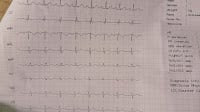Cardiac disease appears to be an independent risk factor for nonamnestic mild cognitive impairment,...
New Metric May Better Detect Cardiac Risk in Patients Taking Atypical Antipsychotics

A cardiac measurement known as the index of cardiac electrophysiological balance (iCEB) is more sensitive at predicting cardiac risk in patients taking atypical antipsychotics over the long term than the traditionally used QT interval, according to a study of hospitalized patients issued today by BMC Psychiatry.
The QT interval reflects the time from when the heart’s ventricle starts contracting (depolarization) to when it finishes relaxing (repolarization); it has been considered a reliable marker to identify abnormal heart rhythms that may lead to problems like arrhythmia. “However, if we only evaluate QT intervals, we may abandon some effective treatments and may also overlook some important information,” wrote Qiong Liu, B.A., of the Chaohu Hospital of Anhui Medical University in Hefei, China, and colleagues.
The researchers noted that QT readings can be biased when the ventricular heart rate is elevated, and the QT interval doesn’t always reflect local changes in ventricular muscle. Rather than assessing the total time of a depolarization-repolarization cycle, the iCEB measures the balance between depolarization and repolarization.
Liu and colleagues studied 80 adults with schizophrenia who began taking atypical antipsychotics after hospital admission and were continuously hospitalized for at least four years at Chaohu Hospital between 2017 and 2023. Alcohol, smoking, and caffeine were prohibited on the ward, and participants underwent electrocardiogram (ECG) readings every 2 to 4 weeks. For this study, the authors analyzed ECG data at five time points for each patient: admission, year 1, year 2, year 3, and year 4. They calculated QT interval and iCEB values, both unadjusted and corrected for heart rate (QTc and iCEBc, respectively).
With long-term use of atypical antipsychotics, participants’ ventricular repolarization index gradually increased with time, but no severe arrhythmia was found. In fact, more than 90% of patients did not develop any arrhythmias, researchers reported. Among those who did, the iCEBc changed before the QTc interval, and always had a larger change compared with the patient’s corresponding QTc changes.
These findings suggest “that the iCEBc is more sensitive than the QTc and has greater clinical value in predicting the risk of arrhythmias caused by antipsychotics,” the authors wrote. While the patients in this stable environment had a low overall rate of adverse events, the authors added that “the iCEB grew significantly longer during the 4-year observation period of this study, so we need to be vigilant.”
For more information, see the Psychiatric News article “Document Outlines Key Clinical Considerations About QTc Prolongation and Psychotropics.”
(Image: Getty Images/iStock/Manuel Reis)
Don't miss out! To learn about newly posted articles in Psychiatric News, please sign up here.





